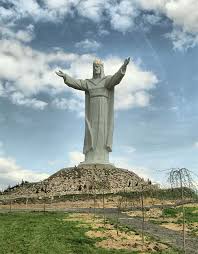Christ the King, Nigeria
Mount Calvary Church
A Roman Catholic Parish
The Ordinariate of the Chair of S. Peter
Anglican Use
Madison Avenue and Eutaw Street
Baltimore, Maryland
The Feast of Christ the King
November 25, 2018
10 A.M. Sung Mass
___________________
Common
Missa de S. Maria Magdalena, H. Willan
____________________
Anthems
Henry Purcell (1659–1695)
O God, the King of glory, who hast exalted thine only Son, Jesus Christ, with great triumph into heaven, we beseech thee leave us not comfortless, but send to us thine Holy Ghost to comfort us, and exalt us to the same place where our Savior Jesus Christ is gone before us, Amen.
Here is the Choir of New College, Oxford.
__________
Eric Spengler
Sedebit Dominus Rex in aeternum.
Dominus virtutem populo suo dabit. Dominus benedicet populo suo in pace.
The Lord shall sit King for ever. The Lord will give strength to his people. The Lord will bless his people with peace.
____________________
Hymns
All hail the power of Jesus’ name (DIADEM) is by Edward Perronet (172?–1792), a member of a Swiss Huguenot family who emigrated to England. He was an associate of the Wesleys. The hymn is one of the most popular in all Christian churches. It begins with a reference to Philippians 2:10: “at the name of Jesus every knee should bow.” In our version the hymn addresses Israel, the chosen people, and then the Gentiles, every nation and tribe, and calls them to join in celebrating the Kingship of Jesus. The song of celebration is “everlasting”: as we sing this hymn we join in the song of the angels and saints, a song that will go on forever.
Here is St. Paul’s Chamber Choir. Here is a version with brass and timpani, the First Plymouth Church of Lincoln, Nebraska.
Prepare the royal highway (MESSIAH) was written by the Swedish bishop Franz Michael Franzén (1772–1847). Its beginning is based on Isaiah 40:4 “Every valley shall be exalted, and every mountain and hill shall be made low: and the crooked shall be made straight, and the rough places plain,” which for English-speakers forever echoes the aria from Handel’s Messiah. But the hymn conflates all the comings of God: Jesus’ birth, His entry into the repentant soul, His triumphal entry into Jerusalem, His coming into the world to establish his kingdom of peace and love, and His final coming at the end of time.
Here is a home school choir. Here it is on the hammered dulcimer. And the piano. Here is Swedish soprano Sissel Kyrkjebø singing a modernized version of the original Swedish Bereden väg för Herran
The king shall come when morning dawns (MORNING SONG) is by the Scottish Free Church minister John Brownlie (1857–1925). He translated many Eastern hymns, and this hymn bears the impress of Eastern theology. Infused with the imagery of morning light typical of early Greek hymnody, hymn stirs hope in the hearts of all who look forward to the return of Christ. It is a confession of faith in the sure return of our Lord; his coming again will occur in a blaze of glory, which will far surpass his earthly death and resurrection. The text concludes with a paraphrase of the ancient prayer of the church-“Maranatha,” or “Lord, come quickly” (Rev. 22:20). We should not fear, but yearn for the coming of the One we love.
Here is a concert in the Gymnasial Kirche, Osnabrück.
